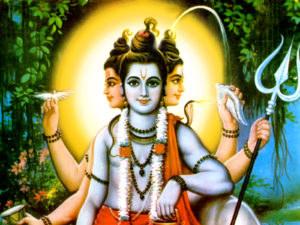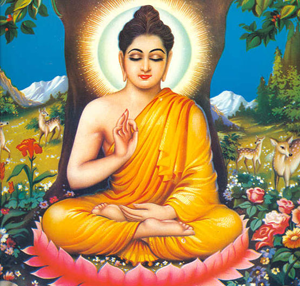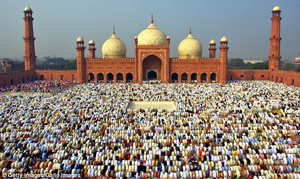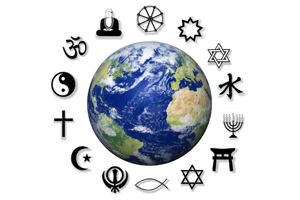Hinduism
 Hinduism has had several
incarnations throughout its existence.
Classical Hinduism (the most
current evolution) started approximately
3,500 years ago. Hinduism
teaches that all people have souls
and these souls are endlessly reincarnated.
The reason for this is
karma. Karma is penance for the
misdoings of the soul. It is the duty
and purpose of the soul to escape
the chains of karma by emancipation.
There are three paths and requirements
for this emancipation:
Hinduism has had several
incarnations throughout its existence.
Classical Hinduism (the most
current evolution) started approximately
3,500 years ago. Hinduism
teaches that all people have souls
and these souls are endlessly reincarnated.
The reason for this is
karma. Karma is penance for the
misdoings of the soul. It is the duty
and purpose of the soul to escape
the chains of karma by emancipation.
There are three paths and requirements
for this emancipation:
The Path of Duty
This is the erasure of emotion and self. All is sacrificed for duty. Man walks throughout life serving his family, social, and economic obligations.
The Path of Knowledge
This is the use of meditation and yoga to gain a true, unobtrusive, clear insight to one's relationship with God.
The Path of Devotion
This is a life-long devotion to the worship and service of God. Physical objects are rejected and total subservience and reverence of God are the goal.
Hinduism teaches that the only true reality is one's inner reality. Sin is not looked upon as evil, but rather distraction or pollution that needs to be cleansed.
Buddhism
 Buddhism is approximately 2,500 years old. Buddhism differs
from Hinduism views in that Buddhism
teaches there is no soul.
There is no internal reality. Buddhism
is an emptying process. The end result
is a state of non-being. Buddhism
holds four Noble Truths:
Buddhism is approximately 2,500 years old. Buddhism differs
from Hinduism views in that Buddhism
teaches there is no soul.
There is no internal reality. Buddhism
is an emptying process. The end result
is a state of non-being. Buddhism
holds four Noble Truths:
1. All existence is subject to misery.
2. Misery originates from our inner desires. We seek pleasure that reinforces being instead of non-being.
3. Cravings of pleasure can be eliminated.
4. By understanding the true nature of man's psyche, man evolves by adhering to the eight tenants: right seeing, thinking, speaking, acting, living, effort, mindfulness, and meditation.
2. Misery originates from our inner desires. We seek pleasure that reinforces being instead of non-being.
3. Cravings of pleasure can be eliminated.
4. By understanding the true nature of man's psyche, man evolves by adhering to the eight tenants: right seeing, thinking, speaking, acting, living, effort, mindfulness, and meditation.
Nirvana, the ideal state of Buddhism is achieved when man totally escapes the confines of his mind and ego. When this is achieved, he is freed from the cycle of reincarnation.
Christianity
 Christianity is approximately
2,000 years old. Modern day
Christianity does not teach reincarnation
yet examples of karma can
be found throughout the bible.
Christianity is approximately
2,000 years old. Modern day
Christianity does not teach reincarnation
yet examples of karma can
be found throughout the bible.
Do not be deceived: God cannot be mocked. A man reaps what he sows. The one who sows to please his sinful nature, from that nature will reap destruction; the one who sows to please the Spirit, from the Spirit will reap eternal life.
Galatians 6:7-8
In this letter to the Galatians, Paul furthers the Hindu and Buddhist belief that materialism and the flesh lead to corruption, but the nonmaterial leads to eternal life. Sin and evil are conquered through confession, atonement, and repentance.
Islam
 Islam is approximately 1,400
years old. Islam began with God's
creation of the first man Adam. The
meaning of Islam is submission and
obedience to Allah, the Creator of all.
Islam believes in the soul, but not in
karma or reincarnation.
Islam is approximately 1,400
years old. Islam began with God's
creation of the first man Adam. The
meaning of Islam is submission and
obedience to Allah, the Creator of all.
Islam believes in the soul, but not in
karma or reincarnation.
Man must resist his urges and temptations and serve only God. Everything than comes from within man is evil. Only Allah is good. Man's evil has rippling consequences that affect everything on the earth. For this reason, all men must serve Allah and only then will widespread good be seen.











